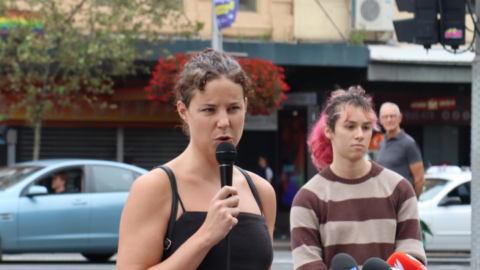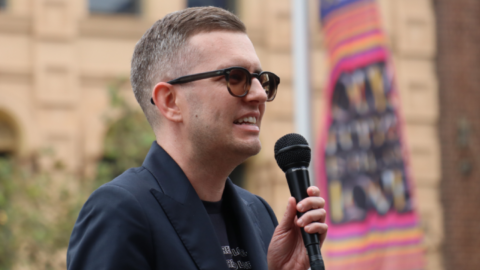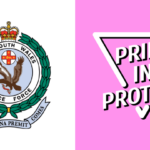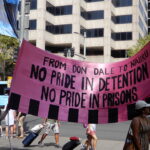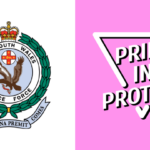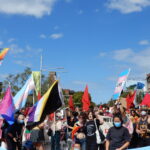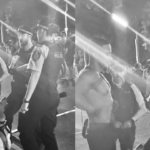NSW Police Out of Mardi Gras Has Been a Long-Time Coming, as March Requests Cops Not Attend
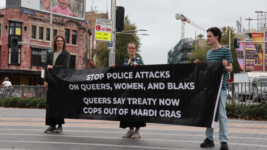
The long-time-coming disinviting of the NSW Police Force from this year’s Sydney Gay and Lesbian Mardi Gras is no surprise.
The circumstances that saw the Mardi Gras Board finally agree with long-term calls for the cops out of Mardi Gras is a shock that’s devastating the LGBTIQA+ community at present.
And the reaction of certain public officials may seem reasonable in the gaggle of the mainstream media cycle, but statements by figures such as the NSW premier and the NSW police commissioner come across as ill-informed, and underpinned by long-time prejudice, to those directly impacted.
NSW police senior constable Beau Lamarre-Condon allegedly shot 26-year-old Jesse Baird and 29-year-old Luke Davies on 19 February.
This officer had already garnered headlines in 2020 for the brutal excessive force he’d shown in tasering a First Nations man in the face in a Darlinghurst park.
The statement that has been made is that a New South Wales police officer has shot down a gay couple, the officer is known to have a publicly exposed history of violent tendencies, and this is against a long-term backdrop of prejudicial and violent policing from an institution steeped in homophobia.
This has led the Mardi Gras Board to request NSW police not to participate in Saturday’s Mardi Gras parade.
And at a Pride in Protest-led press conference on Tuesday in Gadigal-Sydney’s Taylor Square, advocates long calling for cops out of Mardi Gras expressed why the board’s decision is a sound one.
A history of gay hate violence
“We are here to mourn, but we are also here to fight for change,” said Pride in Protest’s Charlie Murphy, who used to be a member of the Sydney Gay and Lesbian Mardi Gras Board.
“Two members of our community were murdered last week, allegedly by police officer Beau Lamarre-Condon,” she added. “Facts revealed in the days since have told us that Lamarre was known personally to Jesse Baird”, and he’d raised concerns with the police about his safety.
Murphy pointed to the face tasering incident, which saw Lamarre internally cleared of any wrongdoing, adding that this act of cruelty is, as far as Pride in Protest is concerned, yet another “glaring example of the institutionally supported abuse, racism and homophobia rampant within the NSW police”.
The Special Commission of Inquiry into LGBTIQ hate crimes from 1970 to 2010 delivered its report to the NSW Governor in December. And this inquiry into murders found “a culture of oppression and discrimination against the LGBTIQ community” existed in the NSW Police Force over this period.
“The NSW police are complicit in the deaths of Luke Davies and Jesse Baird,” Murphy made clear. “If the police had taken seriously the brutality Lamarre exacted upon Chris Bradshaw – taken seriously police violence against Aboriginal people – then Lamarre likely would not have” had a police gun.
Police violence, intimate partner violence
Lamarre is a gay man, who allegedly stalked Baird, who’d been a Channel Ten presenter, after a brief fling and then plotted to kill and murder him and his new boyfriend Davies.
So, not only does this incident involve police violence towards the queer community, but it’s also an instance of intimate partner violence.
During Tuesday’s press conference, Yorta Yorta woman Amanda Morgan of The Blak Caucus underscored that the killings “ are an example of intimate partner violence and that can occur pre, during or post a relationship”, and that it is important to recognise the crime through this lens.
Intimate partner violence has long been at crisis levels right across the continent. And Morgan pointed out that Lamarre’s alleged murders are examples of this violence, which disproportionately affects women, but also affects men and people from diverse communities.
Yet, this doesn’t change the fact that NSW police participation in Mardi Gras has been resisted since it began in 1998, and now an officer who appeared in uniform in the parade has gunned down two gay men using a gun the law enforcement agency permitted him to be out in the community with.
Dozens of unexplained murders of gay men occurred across Sydney, North Sydney and the Northern Beaches over the 1970s onwards till 2010. In the last decades of the 20th century gay bashings were well known in inner city areas. And a tendency not to care was the general impression of police.
NSW police commissioner Karen Webb’s dismissal of the request that law enforcement not partake in Mardi Gras with a quote from Taylor Swift has been taken as dismissive. And her seeming lack of understanding as to why cops are wanted out of this year’s parade is neither appreciated.
NSW premier Chris Minn’s expressed his concerns that police should participate in Saturday’s event. And the Labor leader did acknowledge the long history of gay hate crime in Sydney, but he still wants police to march to show progress. However, unfortunately, recent events don’t reflect this.
The fact is the Mardi Gras Board has been resisting a concerted Pride in Protest-led campaign to get cops out of the parade since 2018. And the board’s long resistance to these calls has now come to an end due to the serious grief and anger in the community caused by a killer cop.
Defunding the police
Along with Pride in Protest and the Blak Caucus, the NSW Council for Civil Liberties, the NSW Greens and the Inner City Legal Centre were represented at the press conference, and First Nations, Māori and Takatāpui person Latoya Rule, a key player in the recent NSW spit hood ban, spoke.
The last past president of the NSWCCL Josh Pallas told the crowd that his organisation started in 1963, “because of a raid at a party where police took off their badges, took off their ranks and insignias, and were searching for gay men to charge with having consensual gay sex.”
The 1978 Mardi Gras was a protest against the criminalisation of diverse sexualities and genders. NSW police surrounded the march, bashed participants, and locked them up. The Herald then published their names in the paper to out them to the community, which could lead to harm.
The 2013 Mardi Gras was marred by aggressive saturation policing. Two incidents of excessive force were investigated in its wake, the most prominent involving then 18-year-old Jamie Reed. And the Mardi Gras Board recently voted against continuing the police accords established after that.
“We have three calls from the Council for Civil Liberties,” Pallas told reporters. “The first is we need to ramp up our conversation about disarming police. Enough is enough. Police violence will be allayed if they don’t have guns strapped to their waists that they can pull out with ease.
“The second call is the police commissioner, yesterday, announced that her colleague, the Victorian police commissioner, is going to look at the weapons policy. That is not good enough. We need an independent weapons policy,” the lawyer continued.
“The third call is gone is the day that it is acceptable, if it ever was, for police to police critical incidents.”
